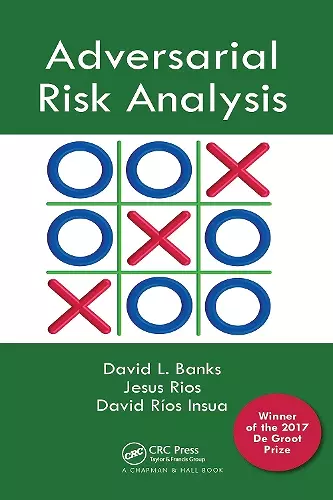Adversarial Risk Analysis
David L Banks author Jesus M Rios Aliaga author David Ríos Insua author
Format:Paperback
Publisher:Taylor & Francis Ltd
Published:30th Jun '21
Currently unavailable, and unfortunately no date known when it will be back
This paperback is available in another edition too:
- Hardback£88.99(9781498712392)

Winner of the 2017 De Groot Prize awarded by the International Society for Bayesian Analysis (ISBA)
A relatively new area of research, adversarial risk analysis (ARA) informs decision making when there are intelligent opponents and uncertain outcomes. Adversarial Risk Analysis develops methods for allocating defensive or offensive resources against intelligent adversaries. Many examples throughout illustrate the application of the ARA approach to a variety of games and strategic situations.
The book shows decision makers how to build Bayesian models for the strategic calculation of their opponents, enabling decision makers to maximize their expected utility or minimize their expected loss. This new approach to risk analysis asserts that analysts should use Bayesian thinking to describe their beliefs about an opponent’s goals, resources, optimism, and type of strategic calculation, such as minimax and level-k thinking. Within that framework, analysts then solve the problem from the perspective of the opponent while placing subjective probability distributions on all unknown quantities. This produces a distribution over the actions of the opponent and enables analysts to maximize their expected utilities.
"This well-written and concise text is an introduction to the field of adversarial risk analysis (ARA), which is a form of decision and risk analysis which incorporates uncertainty and game theory to model strategies of an adversary…There is an appropriate amount of detail throughout the book, making it suitable for a reference text as well as a book which may be read cover to cover and it is both thought provoking and enlightening."
—Matthew Craven, Plymouth University, Journal of the Royal Statistical Society, Series A, January 2017
"Here, Banks (Duke Univ.), Rios (IBM), and Insua (ICMAT-CSIC, Spain) identify three categories of uncertainty for the strategist: aleatory uncertainty—nondeterminism of outcomes even after players make choices; epistemic uncertainty—hidden information concerning opponents' preferences, beliefs, and capabilities; and concept uncertainty—hidden information concerning opponents' strategies. Adversarial risk analysis, a new field with roots in modern efforts to defeat terrorism, provides a framework, in principle, to cope with these uncertainties. Solving the models seems generally intractable, but the heart of the book, the first of its kind, offers exemplary case studies. Summing up: Recommended. Lower-division undergraduates and above; informed general audiences."
—D. V. Feldman, University of New Hampshire, Durham, USA, for CHOICE, March 2016
ISBN: 9781032098494
Dimensions: unknown
Weight: 331g
224 pages